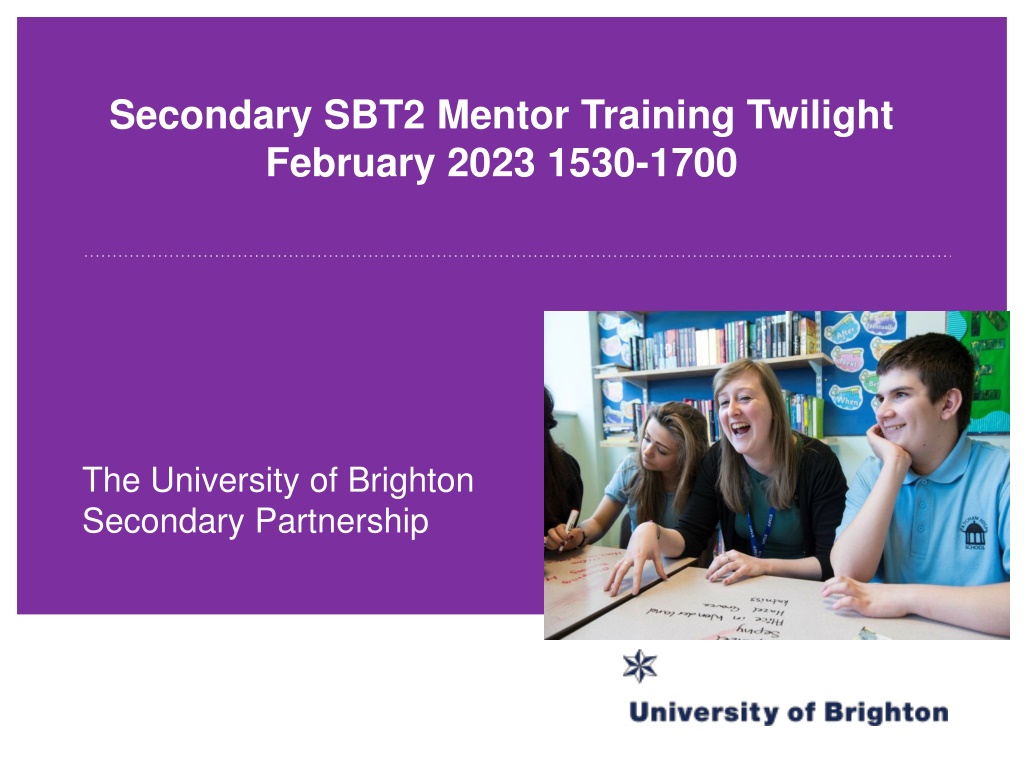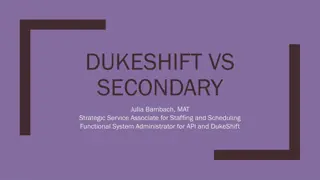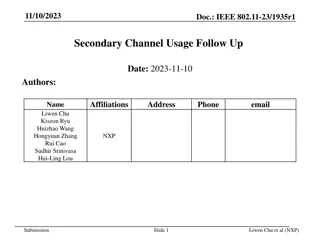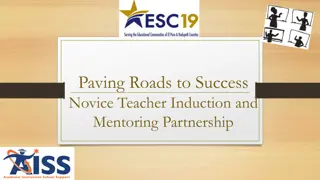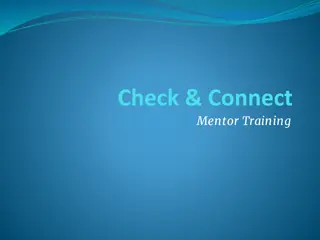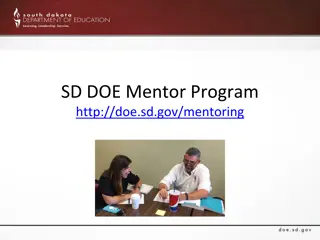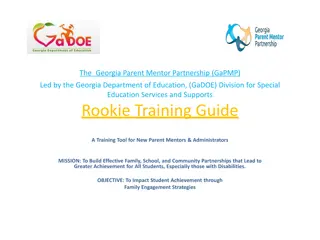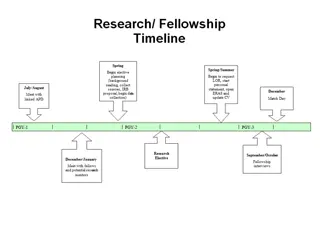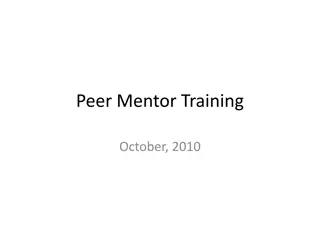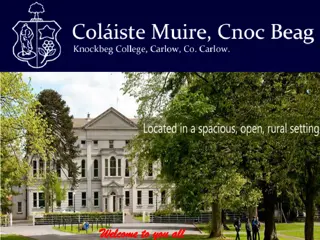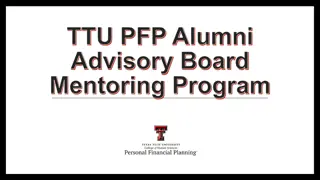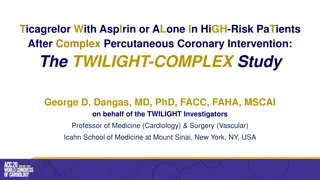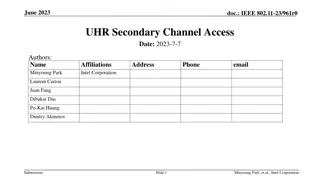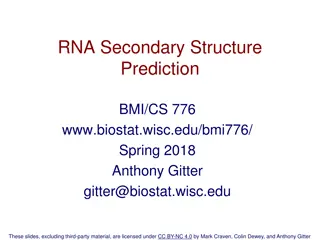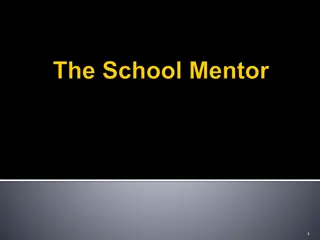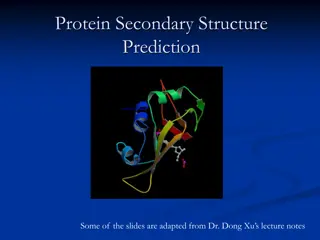Secondary SBT2 Mentor Training Twilight - February 2023 Overview
Discover key information about the Secondary SBT2 Mentor Training Twilight session scheduled for February 2023 at The University of Brighton. Learn about mentor training, access to handbooks, ITTCCF, trainee timetables, mentor meetings, learning outcomes, assessment dates, lesson planning, e-Portfolio usage, observation importance, and more. Engage with the provided mentor training pack for comprehensive guidance. Explore session overviews, curriculum details, improvement plans, target settings, and English-specific topics covered during the training.
Download Presentation

Please find below an Image/Link to download the presentation.
The content on the website is provided AS IS for your information and personal use only. It may not be sold, licensed, or shared on other websites without obtaining consent from the author. Download presentation by click this link. If you encounter any issues during the download, it is possible that the publisher has removed the file from their server.
E N D
Presentation Transcript
Secondary SBT2 Mentor Training Twilight February 2023 1530-1700 The University of Brighton Secondary Partnership
a.denmead@brighton.ac.uk Anne Denmead a.denmead@brighton.ac.uk
Remember SBT2 MENTOR TRAINING PACK 30 minutes Ideally, you will have engaged with this already. If not, please do so asap. It addresses key questions you may have about SBT2. Available on the SBT Blog subject-specific pages.
Overview: SBT2 Mentor Training Pack 1. 2. 3. 4. 5. 6. What mentor training is available? How do I access SBT2 handbooks? What is the ITTCCF and how is it used? What is the SBT2 trainee timetable? When are mentor meetings and how are they structured? What are the SBT2 learning outcomes and assessment dates? 7. 8. 9. What approach is taken to lesson planning during SBT2? What is the e-Portfolio and how is it used during SBT2? How important is observation and deconstruction of other teachers lessons? 10. Finally Any Questions?
Session Overview a) Sharing the inter-SBT Route Curriculum b) Sharing the Route Improvement Plan c) Review use of Observation and Deconstruction Materials during SBT1 d) Review use of SBT1 Weekly Overview Target Setting and Action Planning Handbook e) Introducing SBT2 Weekly Overview Target Setting and Action Planning Handbook f) Target setting in English
a) The Inter-SBT Route Curriculum English SBT1 Reflection and Review Decolonising the Curriculum Reading and Writing in Primary Numeracy in English Supporting Pupil Well-being Poetry by Heart Workshop Teaching the Holocaust Supporting EAL Learners Applying for your First Post Ask an ECT Post 16 Englishes Assignment Planning Tutorials Education & Professional Studies Addressing Inequalities Research in Education Applications, Interviews and References
b) The Route Improvement Plan Target 1: To strengthen trainees understanding of education and professional studies application to practice. Target 2: To prepare trainees to respond appropriately to pupils needs that arise from physical and mental health issues.
Target 1: Apply theory to practice Actions: To incorporate input on principles and practical applications of theory. To extend the range of theory explored in UBT. To flag relevant readings on CCF curriculum map.
Target 2: Supporting pupil well-being Actions: Deliver a UBT session focusing on well-being. Share support materials. Deliver a UBT session on the role and value of the form tutor. Explore well-being during SBT visits/PAT tutorials. Flag in SBT2 target setting. Introduce research related to pupils needs arising from physical and mental wellbeing
c) Review use of Observation and Deconstruction Materials during SBT1 We have a range of materials to support trainees professional development through observing others practice: A guide to observation and deconstruction Initial observation pro forma Other forms to support trainees focus on specific T & L aspects (i.e. adaptive teaching, behaviour, motivation, etc.) Available: https://blogs.brighton.ac.uk/mentors/observation-and-deconstruction-forms/
d) Review use of SBT1 Weekly Overview Target Setting and Action Planning Handbook The weekly overviews were introduced to support mentors and trainees. a) How have you found the use of the new SBT1 weekly overview target setting and action planning handbook? b) What have you found particularly helpful? c) In what ways do you think it might be improved?
e) Introducing SBT2 Weekly Overview Target Setting and Action Planning Handbook Just like in SBT1, in the SBT2 Weekly Overview Target Setting and Action Planning Handbook available on the subject-specific pages of the SBT Blog we have provided mentors and trainees with a list of prescribed weekly professional action plan targets and actions that should be used to support trainee progress. . Each weekly one-page overview gives a detailed breakdown of links to the ITT Core Content Framework and Teachers Standards, the teaching expectations, prescribed targets [Learn how to ] and actions [Learn how to by ], e-Portfolio expectations, the mentor meeting focus, assessment points and suggested literature / supportive resources appropriate to that week.
UoB SBT2 Professional Action Plan Targets and Actions Targets and actions are prescribed as follows: Week 1: 3 prescribed targets and actions Week 2-4: 2 prescribed targets and actions Week 6: 1 prescribed target and actions Week 7: targets generated by SB/SC report Week 8: 0 prescribed targets Available on the SBT blog subject-specific page.
As the SBT progresses As SBT2 progresses we rapidly reduce the number of prescribed targets and actions so that mentors and trainees can devise their own targets and actions specific to the trainee s unique and individual professional journey and development in the embedding and enhancing stages. In those weeks where 3 targets and actions are not prescribed, it means that mentors and trainees can work together to establish further targets so making them up to 3 there should be 3 targets each week that work towards the SBT2 learning outcomes..
f) Target setting in English Prompts for checking effectiveness of a TARGET: Is it focused on learning or is it an action? Does it support the trainee to gain, apply and refine the knowledge and skills related to the ITE curriculum? Is it SMART (ER)? (see guidance below) Can the trainee articulate their understanding of it?
SMART Specific - precise, sharp and centred on trainee s learning rather than actions. Promotes analysis and evaluation of impact. Measurable to identify concrete evidence of trainee s learning and/or the impact trainee s learning has had on pupil progress. Attainable can be realistically achieved within an allotted time span (usually weekly). Relevant - personal and developmental (not repeating SBT Learning Outcomes). Relevant to the school context. Provides the right amount of challenge for the phase of training and applies directly to practice. Time-related specific review of progress (usually weekly).
SMART - ER Evaluated trainee evaluates and records their learning in the target prior to the mentor meeting. Reviewed trainee and mentor review trainee s learning in the target during the mentor meeting.
Weekly Target Examples Use a drama-based approach to develop pupils understanding of Act III Scene 2 of Macbeth. Use live modelling to support 9B2 develop descriptive writing skills. Provide challenge tasks to develop inference skills for Dulce et Decorum est. Support active reading by providing prompts for Jekyll and Hyde Chapter 2. Establish and reinforce key literary terminology in the introduction to the Gothic unit.
Action Examples Target: Use a drama-based approach to develop pupils understanding of Act III Scene 2 of Macbeth. Actions: Observe Ms T teaching Y10 on Tuesday, noting strategies used, particularly classroom management. Select a technique from Cambridge Schools edition. Source a film of the scene from The Globe on line. Write a list of success criteria for the pupil performance.
Finally - Any Questions? If you have any further questions you can: Contact: Anne Denmead a.denmead@brighton.ac.uk We look forward to working in partnership with you!
